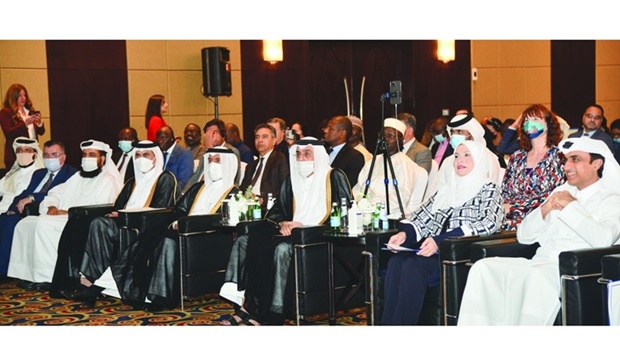* Qatar keen to uphold worker's rights
The International Migrants Day in Doha Monday highlighted the significant contribution of expatriates in nation-building, in both the country of origin and country of destination, through their hard work and dedication.
“Qatar is witnessing an important stage in its history … moving forward in a comprehensive and accelerated development that it has not witnessed before, and expatriate workers play a role in this development,” Ministry of Foreign Affairs Secretary-General Dr Ahmed bin Hassan al-Hammadi said at the celebration, held at Marriott Marquis City Center Doha.

The event, titled 'International Migrants Day: Success Stories from Qatar', was also attended by HE Minister of Labour Dr Ali bin Samikh al-Marri, HE Major-General Mohamed Hamad al-Ateeq al-Dosari, the director-general of passports at the Ministry of Interior, and Dr Mohamed al-Hajri, director of the Health Emergencies Department at the Ministry of Public Health, among other dignitaries, and guests.
Dr al-Hammadi underlined the importance of protecting and promoting the rights of expatriates.

“The current phase has witnessed many important legislative reforms to enhance workers' rights and create a safe environment for work, (with) the sponsorship system abolished and replaced with the contracting system, and specific measures were adopted. The wage protection system was also adopted,” he said.
Dr al-Hammadi said that Qatar participated in all efforts to protect workers, including hosting United Nations offices to strengthen partnerships.
Other initiatives by the Qatar government related to migrant workers were also cited at the event, and the pioneering role of various ministries in supporting UN Sustainable Development Goals (SDGs) and the Global Compact for Migration was highlighted.
Success stories of the integration and coexistence of migrant workers in Qatar were also shared.
In a press statement, the UN Migration Mission in Qatar said the celebration included various presentations by the participating parties from various ministries.
“Throughout history, migration has been a brave expression of the desire of individuals to overcome difficulties and strive for a better life,” said Iman Younis Ereiqat, head of the UN Migration Mission in Qatar. “Statistics indicate that there are about 281mn immigrants around the world.”
“These migrants, through their hard work, contribute to the development of countries of destination and origin, filling gaps in the labour market, and transferring knowledge and skills between different parts of the world,” she added.
Ereiqat lauded Qatar’s efforts in addressing the challenges brought about by the coronavirus (Covid-19) pandemic, providing healthcare and vaccinations for all migrants, regardless of their legal status.
She noted that Qatar also adopted a policy that aims to enable migrants to correct their legal status.
“The reform of labour policies was also an important factor that led to alleviating the impact of the pandemic on migrant workers within the country,” Ereiqat said. “Qatar has ratified the Global Compact for Migration and is one of the pioneering countries in implementing the provisions of this agreement, by preparing a voluntary report and participating in all international forums in this regard.”
“Qatar is witnessing an important stage in its history … moving forward in a comprehensive and accelerated development that it has not witnessed before, and expatriate workers play a role in this development,” Ministry of Foreign Affairs Secretary-General Dr Ahmed bin Hassan al-Hammadi said at the celebration, held at Marriott Marquis City Center Doha.

Dr Ahmed bin Hassan al-Hammadi at the event.
The event, titled 'International Migrants Day: Success Stories from Qatar', was also attended by HE Minister of Labour Dr Ali bin Samikh al-Marri, HE Major-General Mohamed Hamad al-Ateeq al-Dosari, the director-general of passports at the Ministry of Interior, and Dr Mohamed al-Hajri, director of the Health Emergencies Department at the Ministry of Public Health, among other dignitaries, and guests.
Dr al-Hammadi underlined the importance of protecting and promoting the rights of expatriates.

UN Migration Mission in Qatar honoured
“The current phase has witnessed many important legislative reforms to enhance workers' rights and create a safe environment for work, (with) the sponsorship system abolished and replaced with the contracting system, and specific measures were adopted. The wage protection system was also adopted,” he said.
Dr al-Hammadi said that Qatar participated in all efforts to protect workers, including hosting United Nations offices to strengthen partnerships.
Other initiatives by the Qatar government related to migrant workers were also cited at the event, and the pioneering role of various ministries in supporting UN Sustainable Development Goals (SDGs) and the Global Compact for Migration was highlighted.
Success stories of the integration and coexistence of migrant workers in Qatar were also shared.
In a press statement, the UN Migration Mission in Qatar said the celebration included various presentations by the participating parties from various ministries.
“Throughout history, migration has been a brave expression of the desire of individuals to overcome difficulties and strive for a better life,” said Iman Younis Ereiqat, head of the UN Migration Mission in Qatar. “Statistics indicate that there are about 281mn immigrants around the world.”
“These migrants, through their hard work, contribute to the development of countries of destination and origin, filling gaps in the labour market, and transferring knowledge and skills between different parts of the world,” she added.
Ereiqat lauded Qatar’s efforts in addressing the challenges brought about by the coronavirus (Covid-19) pandemic, providing healthcare and vaccinations for all migrants, regardless of their legal status.
She noted that Qatar also adopted a policy that aims to enable migrants to correct their legal status.
“The reform of labour policies was also an important factor that led to alleviating the impact of the pandemic on migrant workers within the country,” Ereiqat said. “Qatar has ratified the Global Compact for Migration and is one of the pioneering countries in implementing the provisions of this agreement, by preparing a voluntary report and participating in all international forums in this regard.”

